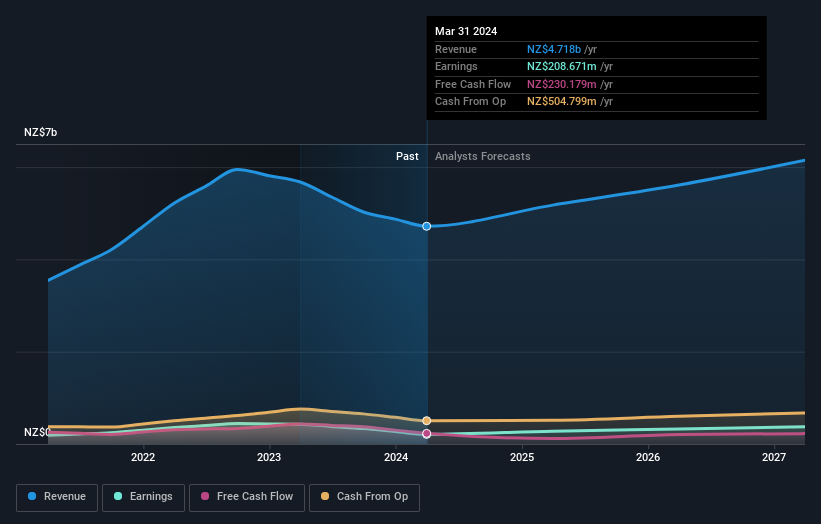- New Zealand
- /
- Logistics
- /
- NZSE:MFT
While institutions own 34% of Mainfreight Limited (NZSE:MFT), retail investors are its largest shareholders with 48% ownership

Key Insights
- The considerable ownership by retail investors in Mainfreight indicates that they collectively have a greater say in management and business strategy
- The top 25 shareholders own 50% of the company
- Insiders have bought recently
Every investor in Mainfreight Limited (NZSE:MFT) should be aware of the most powerful shareholder groups. With 48% stake, retail investors possess the maximum shares in the company. That is, the group stands to benefit the most if the stock rises (or lose the most if there is a downturn).
Meanwhile, institutions make up 34% of the company’s shareholders. Institutions often own shares in more established companies, while it's not unusual to see insiders own a fair bit of smaller companies.
In the chart below, we zoom in on the different ownership groups of Mainfreight.
View our latest analysis for Mainfreight

What Does The Institutional Ownership Tell Us About Mainfreight?
Many institutions measure their performance against an index that approximates the local market. So they usually pay more attention to companies that are included in major indices.
Mainfreight already has institutions on the share registry. Indeed, they own a respectable stake in the company. This can indicate that the company has a certain degree of credibility in the investment community. However, it is best to be wary of relying on the supposed validation that comes with institutional investors. They too, get it wrong sometimes. If multiple institutions change their view on a stock at the same time, you could see the share price drop fast. It's therefore worth looking at Mainfreight's earnings history below. Of course, the future is what really matters.

Mainfreight is not owned by hedge funds. Looking at our data, we can see that the largest shareholder is Rorohara No 2 Trust with 15% of shares outstanding. Fisher Funds Management Limited is the second largest shareholder owning 4.8% of common stock, and JPMorgan Chase & Co, Private Banking and Investment Banking Investments holds about 4.1% of the company stock. In addition, we found that Donald Braid, the CEO has 2.9% of the shares allocated to their name.
On studying our ownership data, we found that 25 of the top shareholders collectively own less than 50% of the share register, implying that no single individual has a majority interest.
While it makes sense to study institutional ownership data for a company, it also makes sense to study analyst sentiments to know which way the wind is blowing. There are a reasonable number of analysts covering the stock, so it might be useful to find out their aggregate view on the future.
Insider Ownership Of Mainfreight
The definition of an insider can differ slightly between different countries, but members of the board of directors always count. The company management answer to the board and the latter should represent the interests of shareholders. Notably, sometimes top-level managers are on the board themselves.
Most consider insider ownership a positive because it can indicate the board is well aligned with other shareholders. However, on some occasions too much power is concentrated within this group.
Shareholders would probably be interested to learn that insiders own shares in Mainfreight Limited. The insiders have a meaningful stake worth NZ$256m. Most would see this as a real positive. If you would like to explore the question of insider alignment, you can click here to see if insiders have been buying or selling.
General Public Ownership
The general public-- including retail investors -- own 48% stake in the company, and hence can't easily be ignored. This size of ownership, while considerable, may not be enough to change company policy if the decision is not in sync with other large shareholders.
Private Company Ownership
Our data indicates that Private Companies hold 15%, of the company's shares. It's hard to draw any conclusions from this fact alone, so its worth looking into who owns those private companies. Sometimes insiders or other related parties have an interest in shares in a public company through a separate private company.
Next Steps:
I find it very interesting to look at who exactly owns a company. But to truly gain insight, we need to consider other information, too. Consider for instance, the ever-present spectre of investment risk. We've identified 1 warning sign with Mainfreight , and understanding them should be part of your investment process.
If you are like me, you may want to think about whether this company will grow or shrink. Luckily, you can check this free report showing analyst forecasts for its future.
NB: Figures in this article are calculated using data from the last twelve months, which refer to the 12-month period ending on the last date of the month the financial statement is dated. This may not be consistent with full year annual report figures.
If you're looking to trade Mainfreight, open an account with the lowest-cost platform trusted by professionals, Interactive Brokers.
With clients in over 200 countries and territories, and access to 160 markets, IBKR lets you trade stocks, options, futures, forex, bonds and funds from a single integrated account.
Enjoy no hidden fees, no account minimums, and FX conversion rates as low as 0.03%, far better than what most brokers offer.
Sponsored ContentNew: Manage All Your Stock Portfolios in One Place
We've created the ultimate portfolio companion for stock investors, and it's free.
• Connect an unlimited number of Portfolios and see your total in one currency
• Be alerted to new Warning Signs or Risks via email or mobile
• Track the Fair Value of your stocks
Have feedback on this article? Concerned about the content? Get in touch with us directly. Alternatively, email editorial-team (at) simplywallst.com.
This article by Simply Wall St is general in nature. We provide commentary based on historical data and analyst forecasts only using an unbiased methodology and our articles are not intended to be financial advice. It does not constitute a recommendation to buy or sell any stock, and does not take account of your objectives, or your financial situation. We aim to bring you long-term focused analysis driven by fundamental data. Note that our analysis may not factor in the latest price-sensitive company announcements or qualitative material. Simply Wall St has no position in any stocks mentioned.
About NZSE:MFT
Mainfreight
Provides supply chain logistics services in New Zealand, Australia, the Americas, Europe, and Asia.
Excellent balance sheet average dividend payer.
Similar Companies
Market Insights
Community Narratives



